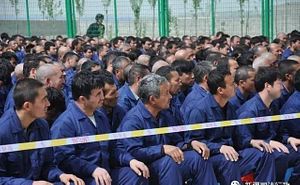“Calling a deer a horse,” or “zhi lu wei ma,” is famous Chinese idiom originating from the Qin Dynasty (221–206 BC).
According to the story, Zhao Gao, the prime minister of the second emperor of the Qin Dynasty, once rode a deer on an outing with the emperor.
The emperor asked: “Prime Minister, why are you riding a deer?”
Zhao replied: “Your Majesty, this is a horse.”
The emperor said: “You are mistaken! That is clearly a deer!”
Zhao said: “If Your Majesty does not believe me, then let’s ask other officials for their opinion.”
When asked, some officials remained silent; others said it was a deer. Some, hoping to ingratiate themselves with Zhao, said it was a horse.
The emperor thus got confused and believed what Zhao said. Then Zhao executed all the officials who said it was a deer, making the rest terrified of him.
Since then, “calling a deer a horse” has been used as an idiom to describe someone deliberately reversing black and white, misrepresenting the truth, and distorting the facts for ulterior motives.
History now seems to repeat itself.
On November 6, China’s human rights record was examined for the third time by the United Nations Human Rights Council’s Universal Periodic Review (UPR). During the UPR, China strongly defended its human rights record, particularly its policies against Uyghurs and other Muslim minorities in Xinjiang — including the widely-criticized establishment of so-called “vocational education and training centers.”
Earlier this year, the UN Committee on the Elimination of Racial Discrimination cited estimates that up to one million Uyghurs may be held involuntarily in extralegal detention in Xinjiang. But China repeatedly denied any mass imprisonment of Uyghurs.
According to Reuters, China has sent a 66-member delegation to the UN Human Rights Council this time. Le Yucheng, Chinese vice minister of foreign affairs as well as head of the Chinese delegation, again rejected all accusations of mistreatment of Muslim minorities and denied any mass detention. Le claimed that China’s establishment of “vocational education and training centers” in Xinjiang was a “preventive measure to combat terrorism.”
Reuters quoted another Chinese delegate as saying that Chinese authorities were “providing free-of-charge vocational training with a diploma after exams” to those who had been “coerced or lured” by extremist groups.
“The extreme terrorism in Xinjiang was quite serious, seriously undermining stability and tranquility in the locality and aroused strong indignation from the people,” said Yasheng Sidike, the Uyghur mayor of the Xinjiang capital, Urumqi. He added that for the last 22 months there had been “no incident of violent terrorism” in Urumqi.
According to China’s state news agency Xinhua, Le also maintained that the Xinjiang vocational education and training program is “established to help those influenced by extremism return to normal life through education. As a preventive measure, it is another major contribution that China has made in international counterterrorism.”
Le told Xinhua that China’s perspective on human rights, such as “no security, no human rights” and “development is a primary human right,” has been “widely understood, recognized, and supported” during the UPR.
However, whatever the argument, the Chinese government is obviously ignoring the fundamental question here: are Muslim minorities in Xinjiang voluntarily taking part in these “free-of-charge vocational trainings”?
If these minorities are restricted to these “training centers” against their will without proper legal grounds, no matter what name the Chinese government uses to refer to these facilities, they do indeed function as detention camps. And detention without trial — not to mention indefinite detention of non-criminal citizens — is against human rights. This is common sense.
The only way for the Chinese government to prove its credibility on its Xinjiang policy now is to demonstrate either that those Muslim minorities are not being held involuntarily in those “training centers” or that those at the centers did commit certain crimes and can be legally detained.
Otherwise, China’s referring to those Xinjiang facilities as “vocational education and training centers” rather than detention camps is only the new era’s version of “calling a deer a horse.”

































